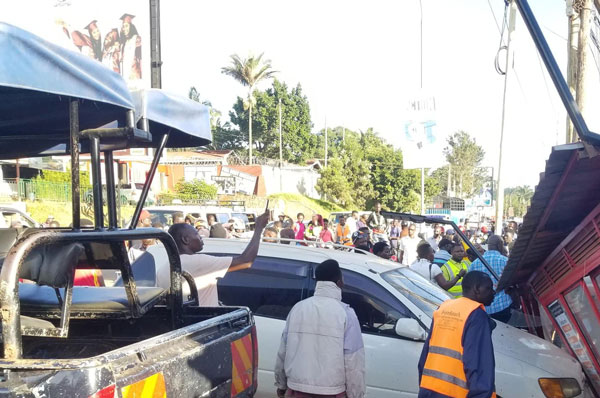
Kampala, Uganda | Xinhua & URN | At least one person was killed and four others were injured after a building collapsed Sunday evening here in Uganda’s capital, police said.
The building is a commercial structure that houses a restaurant near Kampala International University, Luke Owoyesigyire, deputy police spokesperson for Kampala Metropolitan Area said in a statement late Sunday.
He said the victims, all South Sudanese, were reportedly inside the building watching the English Premier League match between West Ham United and Arsenal on television when the accident occurred.
“Four victims with minor injuries were rescued by the community members and rushed to Mukwaya Hospital,” said Owoyesigyire.
He said preliminary investigation revealed that the building had an extension of a story structure with two floors, which collapsed and caved in, adding the investigation is still ongoing.
Meanwhile, Makerere University College of Engineering, Design Art and Technology-CEDAT, and the National Building Review Board-NBRB, consider equipping informal players in the construction sector with basic building skills, to reduce the construction site accidents.
In the recent past, the country has experienced many construction site accidents in which many people have lost lives. Research blamed hiring of non-professional laborers commonly known as Fundi’s and use of substandard building materials for the problem.
With its rapid growth, construction is among the most highly informal sectors in Uganda and unlike in very big projects, developers opt for non-professional labor since it is cheap and readily available.
Officiating at the at the second Fundi’s sensitization workshop in Makerere, Flavia Gutto Bwire, the NBRB executive secretary, said that it is very vital to equip these people with the basic construction skills because it saves them as individuals and the society for whom they construct these building.
Gutto adds that Fundi’s are vulnerable because in case of site accidents, they are the instant victims. Moreover most of them do not follow the building control regulations and the entire construction legal framework.
This year’s training had up to 200 participants from Kampala district, but Gutto says there are plans to scale up the trainings to other parts of the country.
“Last year was a trial and we did 65, one year down the road we are now going to evaluate and see what has changed since the last training,” she said. “Based on the evaluation of what has changed on ground, we will scale up to other parts of the country. Our aim is to ensure that Fundis can be able to differentiate fake building materials from genuine ones, understand an approved architectural plan, and also have the ability to resist the developer’s instructions which always mislead them, but rather follow professional guidelines.”
To Amir Kiggundu Tamale, the head of department of art and physical planning at CEDAT, the construction industry, doesn’t have enough professionals to serve the market and that is where Fundis come in to fill the gap.
According to Kiggundu, the building collapses have always been attributed to the Fundis since they are not competent enough. He adds that since the competent people don’t have the numbers to satisfy the market demand, there was need to help Fundis become more knowledgeable and serve society better.
Fundis are the right people, says Kiggundu, because they at least have some skills about construction which they learnt on site. He adds that the university felt obliged to share with them the knowledge it has accumulated to build capacity.
“Our country is faced with a funny education system, where there are people who graduate in community universities, like on sites, and then those who go through the formal education system,” he explained. “Even in the health sector they used to recognize mid wives who didn’t go through medical school, so with think this is something we can also do as a collage. This will bridge the gap between the university and the community, because Fundis are closer to the community, and they can serve as our change agents.”
Expedit Ssendikadiwa, one of the informal masons with over 20 years of experience, and who took part in the training, says that in addition to what he learnt from site, the training has made him understand some things and how they can be done properly, especially interpreting the plans.
Ssendikadiwa, adds that in his experience, he thought that professionalism of those who went to engineering school is only sought in big projects like storied buildings which is not the case, according to what he learnt in the workshop.
On the other hand, he says, “most of the developers are very rigid with their thinking, and also very resolute not to seek professional advice on their projects even though some fundis recommend them to do so. “But I haven’t been reporting them to authorities as we have been told, for fear of losing my job.” ■
 The Independent Uganda: You get the Truth we Pay the Price
The Independent Uganda: You get the Truth we Pay the Price


